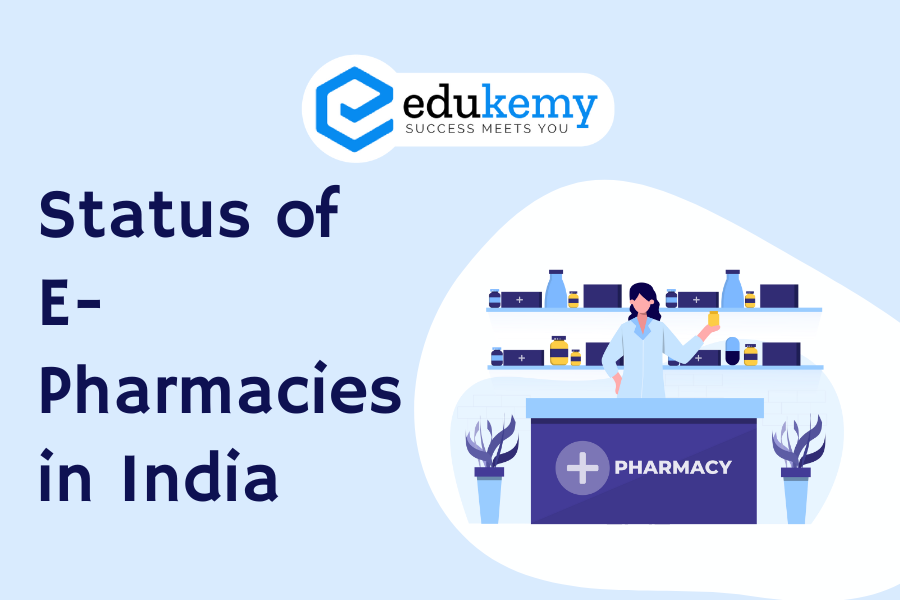
The status of E-pharmacies in India is a dynamic tapestry of innovation, regulation, and societal adaptation. Over the past few years, propelled by advancements in technology and changing consumer preferences, E-pharmacies have emerged as a disruptive force in the Indian healthcare landscape. Offering the convenience of ordering medications online, coupled with doorstep delivery, they have swiftly gained traction among consumers seeking accessibility and efficiency in healthcare services. However, this burgeoning sector operates within a regulatory framework that is continuously evolving to address concerns related to patient safety, data security, and fair market practices. Amidst debates and deliberations, the status of E-pharmacies in India reflects a balancing act between embracing innovation and ensuring regulatory compliance to safeguard public health interests.
Contents
E-Pharmacy
Online pharmacies, commonly known as E-pharmacies, provide a digital platform enabling customers to acquire medicines and various healthcare products through the internet. These pharmacies function via websites or mobile applications, offering users the convenience to upload prescriptions, choose required items, and seamlessly place orders. The hallmark of E-pharmacies lies in the efficient doorstep delivery of products, contributing to their rising popularity owing to the trifecta of convenience, accessibility, and cost-effectiveness.
In 2021, the market for online pharmacies was worth ₹25.50 billion. It is anticipated to expand at a compound annual growth rate (CAGR) of 22.20% from 2022 to 2027 when it is expected to reach ₹89.47 billion.
Legislative Framework for E-Pharmacies in India:
Presently, the regulatory landscape for E-pharmacies in India lacks specific guidelines, presenting a notable obstacle to the flourishing online drug store market in the country. Currently, E-pharmacies adhere to established regulations such as the Drugs and Cosmetics Act 1940, the Drugs and Cosmetics Rules 1945, the Pharmacy Act 1948, and the Indian Medical Act 1956. However, the electronic sale of physician-prescribed drugs through online platforms is explicitly addressed under the IT Act, 2000.
E-pharmacies operate under the oversight of state drug controllers, with approvals granted by the Drug Controller General of India (DCGI). In 2018, the Ministry of Health and Family Welfare (MoH&FW) introduced draft rules to regulate the online sale of medications and ensure the availability of genuine drugs from authenticated online platforms. Despite initial momentum, the proposal was placed on hold after being referred to a group of ministers.
Subsequently, court orders and recommendations from the 172nd Parliamentary Standing Committee report have consistently advocated for the regulation of e-pharmacies. A robust regulatory framework becomes imperative, especially in the context of rising concerns such as antimicrobial resistance (AMR) and the prevalence of criminal and hazardous drug activities.
Competition Dynamics between E-Pharmacies and Chemist Shops:
Fuelled by substantial private equity investments, e-pharmacies have aggressively entered the market by offering significant discounts on medicines to capture a larger market share. These online platforms tout the convenience of doorstep delivery, with companies like PharmEasy establishing an extensive supply chain through strategic acquisitions of wholesale drug distributors.
However, this rapid expansion has come at a cost, as e-pharmacies have consistently reported losses since 2015. For instance, Tata-1 Mg recorded a loss of ₹146 crore in FY22. The competitive landscape is marked by a balancing act between offering attractive discounts to consumers and sustaining financial viability.
Banning E-Pharmacies: A Viable Option?
The burgeoning demand for the online delivery of drugs, particularly highlighted during the lockdowns of 2020 when approximately 8.8 million households utilized home delivery services, complicates the prospect of banning e-pharmacies. The fear is that a prohibition could drive some of these businesses underground, posing challenges to regulatory control.
In essence, the regulatory framework for e-pharmacies in India is currently at a crossroads, demanding careful consideration of the evolving dynamics, consumer demands, and the imperative to ensure public safety in the pharmaceutical space.
FAQs
Q: What are E-Pharmacies?
E-Pharmacies, also known as online pharmacies, are platforms that allow users to purchase medicines and healthcare products online. These platforms provide a convenient way for individuals to order medications from the comfort of their homes and have them delivered to their doorstep.
Q: Are E-Pharmacies Legal in India?
Yes, E-Pharmacies operate under the regulations set by the Drugs and Cosmetics Act, 1940, and the Pharmacy Act, 1948, in India. However, there have been ongoing discussions and regulatory changes to streamline the operations of E-Pharmacies and ensure the safety and authenticity of medications sold online.
Q: What are the Benefits of E-Pharmacies?
E-Pharmacies offer several benefits, including easy access to a wide range of medications, competitive pricing, convenience of doorstep delivery, and the option for discreet purchases, especially for sensitive health conditions. Additionally, they often provide access to information about medicines and health-related resources.
Q: What Challenges do E-Pharmacies Face in India?
E-Pharmacies in India encounter challenges related to regulatory compliance, concerns about the authenticity and quality of medicines sold online, competition with traditional brick-and-mortar pharmacies, and ensuring patient privacy and data security. Regulatory ambiguity and evolving laws also pose challenges for the growth and operation of E-Pharmacies.
Q: What is the Future Outlook for E-Pharmacies in India?
Despite challenges, E-Pharmacies are expected to continue growing in India, driven by factors such as increasing internet penetration, rising healthcare awareness, and the growing preference for convenience among consumers. However, achieving a balance between innovation and regulatory compliance will be crucial for the sustainable development of the E-Pharmacy sector in India.
In case you still have your doubts, contact us on 9811333901.
For UPSC Prelims Resources, Click here
For Daily Updates and Study Material:
Join our Telegram Channel – Edukemy for IAS
- 1. Learn through Videos – here
- 2. Be Exam Ready by Practicing Daily MCQs – here
- 3. Daily Newsletter – Get all your Current Affairs Covered – here
- 4. Mains Answer Writing Practice – here

